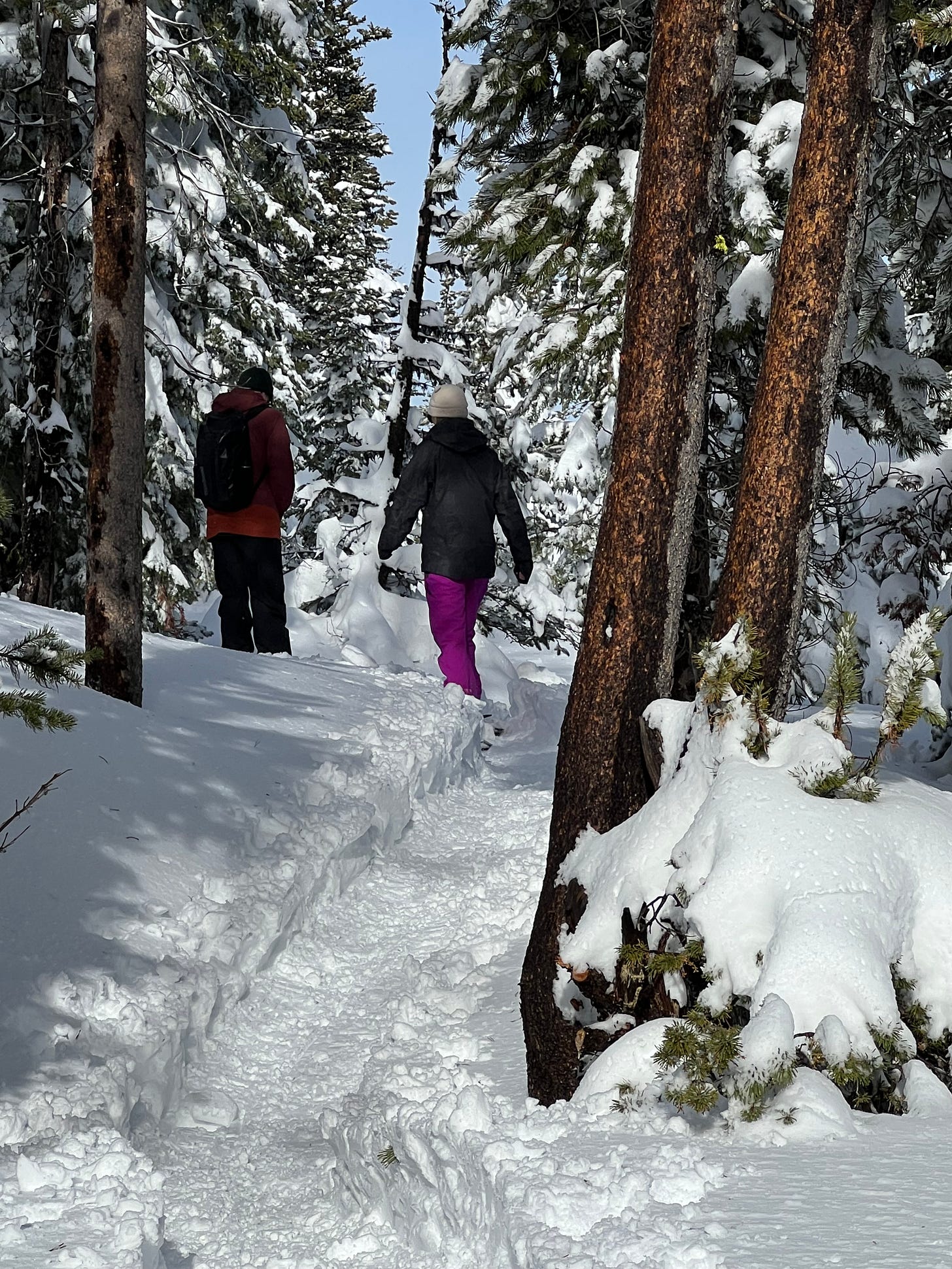Breaking Trail
I’m beginning to appreciate the limitations of my aging body.
Over the recent holidays, my wife and I visited our son and daughter-in-law in Bend, Oregon. While there, we joined them snowshoeing in the nearby Cascade Mountains. It may be the first time I’ve strapped on snowshoes, but growing up in Minnesota I often skied cross-country, and I was no stranger to the joys of trekking through newly fallen snow under clear blue skies.
Skiers and snowshoers often follow trails broken by earlier visitors, but it is a particular joy to leave the beaten trail and break through untouched fields of snow. In my youth, I regularly followed the imperative to take the road less travelled. Frost was right, it does make all the difference, not just in where you go but in how you get there. Breaking trail through newly fallen snow is hard work, especially when the snow is deep or heavy. Full of restless energy, I used to look for that kind of hard work: blow off some steam; put behind me the frustrations or maybe just the cobwebs accumulated during hours indoors. Or sometimes I simply yearned for the cleanliness and order of untrod snow with the knowledge that none had yet passed that way. I was rewarded by the unbroken tracks of birds, squirrels, or fox and by a sense of solitude and accomplishment.
Our recent snowshoe trip fell on a morning following a foot of new snow layered over several feet already on the ground. We started on a broken trail. Though the trail was still soft enough for a hiker without snowshoes to have a tough go of it, our snowshoes made walking easy. We sank into the lightly packed snow just enough to cushion our tread and we made good time as we passed trees drooping under the weight of thick snow. We were working hard enough to appreciate a stiff breeze that kept us from overheating, but not so hard as to distract us from the joy of being out in the fresh air on a clear, crisp day. From time to time I looked away from the trail into clearings between the trees, and felt the old urge to strike off into unbroken snow.
After about half an hour we came to a stop. A dozen snowshoers rested on the trail ahead of us; they had been breaking the trail we were following and, benefitting from their hard work, we had caught up to them. We passed them, thanking them for the work they had done, and with our son and daughter-in-law leading the way, we took up the front of the line. Now, instead of a trail trodden by a dozen sets of snowshoes, I was kicking up snow just barely tamped down. Our son and daughter-in-law are both young and strong, but they were slogging and, though I had the benefit of their work, I was barely keeping up.
I have hiked and bicycled with my sons since they were small enough to be carried in backpacks. Even as they grew to adolescents and young adults, I found myself leading the way, urging them to keep up or showing them the way. More recently I led only so I could set a pace I knew I could sustain. But something struck me as we finished our snowshoe trip: the need to be in front was gone. I was happy to leave the work of breaking trail to others, younger and stronger than I. My urge early in the trip to head off into new fallen snow was gone too. I was content to admire the pristine fields I passed on my left and right rather than charging into them.
When I started riding my bicycle in our hilly neighborhood on the outskirts of Los Angeles, I looked for routes around the harder hills. I soon realized I could not avoid the hills, so I embraced them. These days when I bicycle or hike I still press uphill, looking for the rewarding vistas that open up as my heart rate climbs. “When the going gets tough, the tough get going” is probably part of my genetic heritage.
But it takes me longer to get up hills than it used to. There are some tough climbs I last did years ago – I don’t see myself doing them again. I’d still like to strike off across a field of new fallen snow, but make it light snow, not too deep. And as I recall, it’s easier to break trail with skis than snowshoes, so make it skis, if you can. I’m ready to leave the harder trail breaking to those who are younger and stronger. When they stop to rest, I’ll chat with them a while, point out something they may have missed, give them the perspective of my years. And when it’s time to move on, without any shame or guilt, I’ll wave them ahead and follow gladly.






